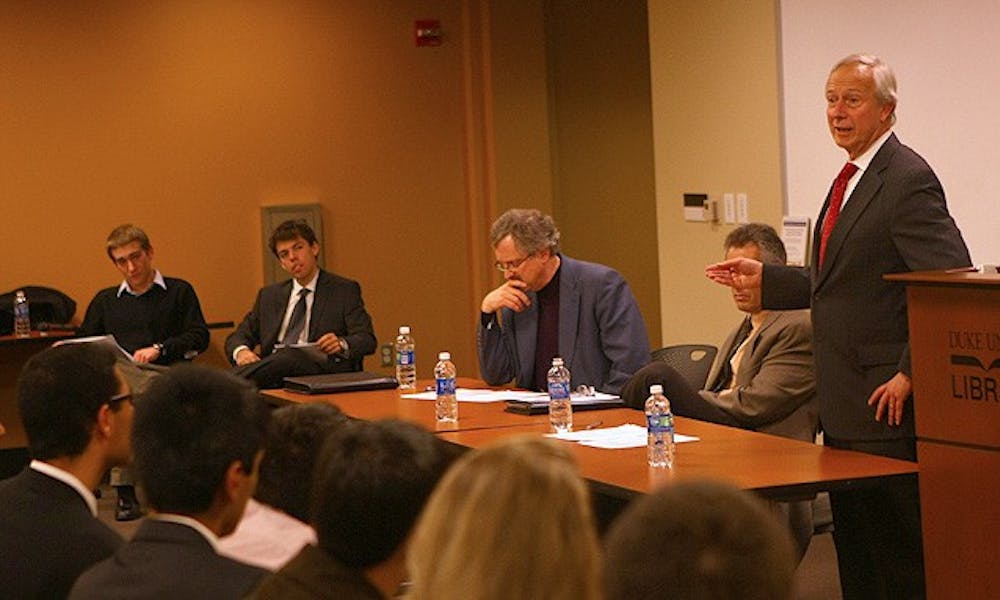Students got the rare opportunity to question top administrators about campus culture, scandals and decisions that take place behind administrators’ closed doors.
Much of the discussion at the hour-and-a-half open forum Thursday night, however, came back to what students themselves do behind closed doors—especially what happens when those actions quickly spread beyond campus walls.
“At the end of the day, there are things that you have to learn in college... and one of them is the appropriate use of freedom for yourself and for those you love,” President Richard Brodhead said at the event, which drew more than 100 students. “It seems to me that a school has to allow freedom to students to give them the space to become responsible, and [the school has] to work with students to accept that responsibility.”
Although her name was never explicitly stated in the forum, much of the discussion centered around the negative publicity nationwide that came after a salacious PowerPoint produced by Karen Owen, Trinity ’10, spread to far more than the three friends to whom she initially sent it. In addition to discussing Owen, students raised questions about fraternity “progressive” parties and social e-mails, Tailgate and the gay, lesbian, bisexual and transgender community.
The panel—which consisted of Brodhead, Vice President for Student Affairs Larry Moneta, Steve Nowicki, dean and vice provost of undergraduate education, and Dean of Students Sue Wasiolek—spent a large portion of the forum addressing the media’s “negative perception” of Duke.
“I think it’s very simple how we change that,” Wasiolek said, noting the viral nature of the media. “We have complete control over our behavior... and if we choose to behave in a particular way and someone chooses to capture that and then spread it all over the world, we have the ultimate control over that. If that’s the way we are going to behave, that’s the way we are going to be perceived.”
Although many students in the audience enjoyed the opportunity to hear administrators speak about controversial topics—especially the campus social scene—some audience members voiced concerns that in focusing on the negative media attention the University has received administrators were overlooking more relevant concerns.
“I believe [the crude fraternity e-mails] highlighted extremely concerning gender relations on this campus—the poor treatment of women and the often hostile environment for students such as myself who identify as gay, lesbian, bisexual, transgender or queer,” senior Jessica Macfarlane said. “That is the Duke that I do live everyday and that is my experience, and I don’t think that I am alone in that. So I feel that to say that the media is making us look bad completely invalidates my experience.”
In responding to the perception that the administrators were minimizing real problems on campus, Moneta said administrators will have to continue to deal with pervasive issues.
“I think this is going to be our constant battle,” he said. “This is something that we are going to have to roll up our sleeves and just attack every element that makes the negative part of your experience something you have to live with.”
In addressing the ethical and moral actions of students—especially concerning social life—administrators argued for a change in the notion that Duke students should live in a “work hard, play hard” atmosphere.
“I heard a better [motto] today—think hard, play well,” Brodhead suggested. “The goal is to use your intelligence in the work that you do, or through the work that you do. That is our aspiration.”
In light of the controversy surrounding the social scene that reemerged last semester, students asked administrators if the greek system should be overhauled, or even eliminated entirely.
“[Fraternities] have the potential to be so much more than I think they themselves showcase within the Duke community,” Moneta said. “I know that we can get there, but it does require us looking ourselves in the face and acknowledging that there are parts of what [fraternities] do that we have to end.”
In answering one of the more controversial questions of the night about what he most regrets most about his presidency, Brodhead brought up a topic many Dukies avoid—the lacrosse scandal, which also brought national attention to campus five years ago.
“It was all based on a district attorney who, as we came to learn one year later, lied and lied and lied about the nature of the evidence that was there, precipitating all of the massive emotion at that time,” he said. “Believe me, I would have loved to have made that situation stop in its tracks.”
Brodhead and Nowicki also addressed questions about the elimination of courses and professors, saying that most of those rumors emerged from a “misunderstanding.” Although they mentioned that the University has eliminated the equivalent of about 450 positions since the economic recession hit in 2008, they noted that many of those positions were eliminated through attrition.
Moving beyond Durham, Brodhead responded to the perception that expanding into foreign locations like China is a “trade-off” because it takes resources away from the Gothic Wonderland.
“I just don’t see the truth in that at all,” Brodhead said. “The day will come when the kind of students that we want to come here will not come here if this University doesn’t expand its horizons to become as interesting as the world that will be relevant in your lifetime.”
After the forum, freshman Leilani Doktor said she was concerned that some of the responses administrators gave were too predictable.
“I was hoping that it would be a little more of a realistic interpretation of the events than just the statements that they e-mail out to us every day,” Doctor said. “I did feel that a lot of it was orchestrated since a lot of the questions were pre-submitted.”
Get The Chronicle straight to your inbox
Signup for our weekly newsletter. Cancel at any time.

